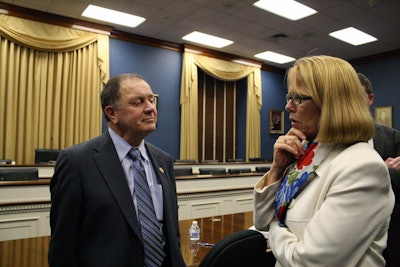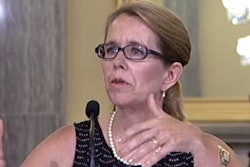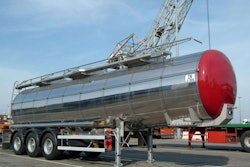Rep. Richard Hanna, an outspoken critic of the most recent hours-of-service rule, has issued a statement calling the Federal Motor Carrier Safety Administration’s Jan. 30-released field study findings on the rule “worthless” and said the report “underscores the need” for Congress to take action to at least temporarily undo the rule change.
The American Trucking Associations has also released statement Jan. 30 that calls the report “lacking” in several areas.
 Rep. Richard Hanna talks with FMCSA Administrator Anne Ferro after a House hearing on the impacts of the hours-of-service rule on small businesses.
Rep. Richard Hanna talks with FMCSA Administrator Anne Ferro after a House hearing on the impacts of the hours-of-service rule on small businesses.Hanna pressed FMCSA on the whereabouts of the study in August of last year, even before the agency missed the Congressionally required Sept. 30 deadline to report the findings of its field study.
“Considering the study arrived four months late, I expected a robust report, but the study is worthless,” he said. “The study’s narrow scope,” Hanna says, “does not address perhaps the most serious issue that could change the entire outcome of the study — forcing truckers to work in the morning rush hour when roads are most congested and dangerous.”
ATA underscored the same point in its response to FMCSA’s report: “The study did not address the real-world safety implications of putting more trucks on the road during daytime hours, a time when more passenger vehicles are also on the road,” ATA’s statement says.
Dave Osiecki, ATA’s chief of national advocacy, said the study’s analysis is incomplete and does not provide justification for the rule’s provisions.
“While the study includes some findings favorable to certain portions of the new restart rule, the incomplete nature of the analysis and the lack of justification for the once-weekly use restriction is consistent with the flawed analyses that led the agency to make these changes in the first place,” Osiecki said.
ATA released a study in November that concluded the opposite of FMCSA’s study, that drivers under the new rule are more fatigued and less productive.
Hanna, who has sponsored a bill in the U.S. House that would overturn the hours rule until the Government Accountability Office can study it further, called the study “half-baked,” and said his bill would allow “independent analysis of the study so we can get a credible account of what this rule will truly mean for the safety of truckers, commuters and businesses.”
The Senate, too, has introduced a version of Hanna’s bill. Both are in committee in their respective chambers.
The Owner-Operator Independent Drivers Association, says in a statement it is “skeptical” of the study’s findings.
“The study does not appear to us to be representative of those actually affected by the newer hours of service so we are skeptical it can be applied to the larger population within the industry.”










